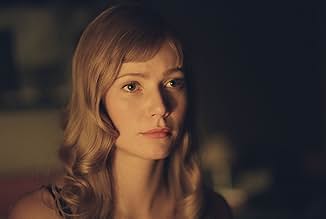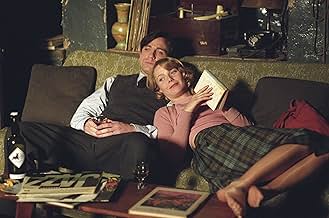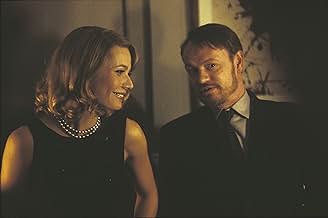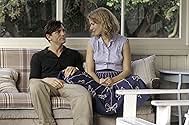Story of the relationship between poets Edward James "Ted" Hughes and Sylvia Plath.Story of the relationship between poets Edward James "Ted" Hughes and Sylvia Plath.Story of the relationship between poets Edward James "Ted" Hughes and Sylvia Plath.
- Awards
- 1 win total
- Director
- Writer
- All cast & crew
- Production, box office & more at IMDbPro
Storyline
Did you know
- TriviaFrieda Hughes, Sylvia Plath's daughter and literary executor, didn't allow the producers to access to her mother's poetry. She also publicly denounced the project in a published poem of her own.
- GoofsWhen Ted and Sylvia are in bed together and she is discussing her suicide attempt, you can clearly see Daniel Craig's tattoo through the make up on his shoulder and Gwyneth Paltrow's hair net to which her wig is attached.
- Quotes
Sylvia: [to Ted, after making love] We're not even two people. Even before we met, we were just these two halves, walking around with big gaping holes in the shape like the other person. And when we found each other we were finally whole. And then it was as if we couldn't stand being happy so we ripped ourselves in half again.
Featured review
There is a certain type of undergraduate who sees Sylvia Plath as the victim-heroine of a period that lionized talented men but had no place for women of similar gifts, and fortunately this film does not pander to them. Poets rarely receive lavish acclaim or wealth during their lifetimes, and hers was at least equal to her talent and irrespective of her gender. Any reasonably critical reader of her autobiographical novel The Bell Jar can see evidence of serious mental illness, which in Plath's case went largely untreated, and this film chooses to focus more on that aspect of her life than on anti-feminist conspiracy theories. However, the film comes up short of fully showing Plath as the highly complex and contradictory person her contemporaries knew: sexy, seductive yet so harsh and venal in her judgments of men (especially her husband and her father) as to seem man-hating; also manipulative and vain and yet so insecure that she went long periods without writing. She was likely bi-polar and could on occasion be described as downright monstrous, yet the film hollywoodizes Plath into a more conventional 'troubled' melodrama heroine, rather than delving deeper into the brutal reality of the day-to-day life of someone with significant mental illness. This is surprising given that director Christine Jeffs' earlier film on mental illness, Rain, was unstintingly honest. Plath's well known life history is covered in straightforward biopic narrative: her close-distant, love-hate yo-yo relationship with her mother; her famous first suicide attempt and the subsequent year spent in a sanatorium that was the basis for The Bell Jar; her rocky marriage to British poet Ted Hughes that ended because of his infidelity; her prolific period as a celebrated poet and her eventual death by suicide while still young.
I should point out that I thought the cinematography and production design were wonderful. The excellent period look is established by bleeding out bright color from every scene while giving it an amber tint like old photographs. The sets were almost hyper-realistic - cluttered, dim and claustrophobic with none of the romanticized shininess that Hollywood often lavishes on period dramas.
I should point out that I thought the cinematography and production design were wonderful. The excellent period look is established by bleeding out bright color from every scene while giving it an amber tint like old photographs. The sets were almost hyper-realistic - cluttered, dim and claustrophobic with none of the romanticized shininess that Hollywood often lavishes on period dramas.
- How long is Sylvia?Powered by Alexa
Details
Box office
- Budget
- £7,000,000 (estimated)
- Gross US & Canada
- $1,315,498
- Opening weekend US & Canada
- $58,940
- Oct 19, 2003
- Gross worldwide
- $2,917,393
- Runtime1 hour 40 minutes
- Color
- Sound mix
- Aspect ratio
- 2.35 : 1
Contribute to this page
Suggest an edit or add missing content




































